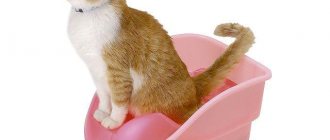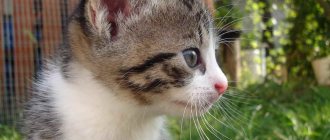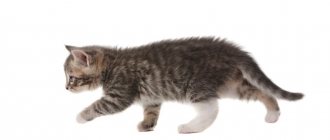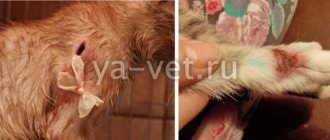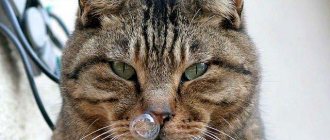Fecal incontinence occurs when a cat loses control over bowel movements. For this reason, cats may frequently defecate around the house or outside the litter box. Some pet owners confuse fecal incontinence with behavior problems and consider training their cat to use the litter box. However, since fecal incontinence is an indicator of gastrointestinal and rectal disease, pet owners should perform a veterinary examination to diagnose the underlying problem and begin treatment early.
The causes of fecal incontinence vary. Older pets may take longer to reach the litter box and therefore defecate in unusual places. Other pets may suffer from intestinal tumors, parasitic infections and lower urinary tract diseases.
Why is constipation dangerous?
Defecation is a natural process through which the intestines are freed from processed substances. If feces are retained and not released for several days, this leads to severe intoxication of the body.
When a cat is constipated, bacteria that live in the large intestine release toxins, and waste bile contains breakdown products of hemoglobin.
If a cat cannot go to the toilet for a long time, and this happens often, this is bad. This means the pet needs help. After all, systematic constipation can lead to intestinal obstruction and internal bleeding.
Causes of constipation in cats
If your cat cannot go to the toilet in a big way, it is important to find out the cause of the problem. Constipation is not a disease, but only a symptom that indicates some kind of disorder in the body.
The main causes of constipation in cats:
- The pet drinks little. Due to lack of moisture, stool hardens and moves poorly through the intestines. This often happens when a cat is suddenly switched to dry food.
- Errors in nutrition. Feeding a cat food from the human table can lead to a lack of vitamins and microelements. Because of this, the functioning of various body systems, including the digestive system, is disrupted.
- Stress. A cat may experience constipation after experiencing a fright, a change of owner or place of residence, and a kitten may experience constipation after separation from its mother.
- Worms. Infection with parasites leads to disruption of intestinal function - stool becomes irregular, constipation alternates with diarrhea. In advanced cases, when there are a lot of helminths inside, they interfere with the movement of feces through the intestines.
- Taking diuretics or iron supplements.
- Low mobility. Elderly, pregnant cats, as well as cats with joint diseases have problems with bowel movements because they move little.
- Hairballs. Constipation often occurs due to obstruction of the intestines, as hair clumps accumulate in the intestines.
- Foreign body. If a cat swallows an object, this can also cause constipation.
- Scars in the rectum or anus.
- Distension of the intestines as a result of prolonged constipation.
- Diseases of the paraanal glands in cats.
- After childbirth and abdominal surgery, there are also stool disorders.
Attention! Older cats are more likely to be constipated. It is associated with weakened intestinal motility. In small kittens, this problem occurs due to imperfections in the digestive system.
Chronic diseases that can cause constipation in a cat
Often, constipation is accompanied by diseases that are associated with disturbances in the functioning of the endocrine system:
- diabetes;
- tumors in the rectum or anus;
- kidney pathologies;
- congenital anomalies of the gastrointestinal tract.
Spinal injuries, which damage the nerve roots of the spinal cord, lead to loss of sensation, and the cat cannot poop.
Causes of fecal and urinary incontinence
There can be many factors that provoke involuntary release of intestinal and bladder contents in cats. Fecal and urinary incontinence occurs in both very young kittens and adult animals. Usually, different reasons lead to this problem in pets of different ages. Knowing what exactly triggered the development of incontinence, it is easier to normalize the process of bowel movements.
In kittens
If a kitten weaned from its mother does not hold feces, it is possible:
- He was incorrectly switched to adult food. Babies' intestines are not yet strong, so they must be switched to natural food or ready-made food with extreme caution. Diarrhea in small pets can be caused by foods that are difficult to digest or by overeating.
- He ate something stale. In this situation, in addition to diarrhea, the kitten may begin to vomit.
- A foolish baby was poisoned, for example, by a poisonous houseplant or household chemicals.
- A small cat is allergic to some natural product or component of a finished food.
- A pathological process of viral or bacterial etiology develops in the baby’s body. The fragile immunity of kittens is not able to withstand the attack of viruses and bacteria. When they get into their body, the animals weaken, become lethargic, refuse food, and can go under themselves, unable to reach the tray.
- The baby experienced a strong emotional shock. A baby taken away from his mother feels lonely and defenseless. When he finds himself in a new unfamiliar home, he may experience stress, the side effect of which is fecal and urinary incontinence. You should not scold the baby, you need to caress him, calm him down and let him know that his new family loves him and will protect him from any danger.
- A small pet has congenital anomalies in the structure of organs involved in the excretion of urine and feces. If this is so, the baby will defecate anywhere from the first days of weaning from his mother.
In adult cats
Causes of involuntary release of intestinal and bladder contents in adult animals:
- Childbirth. Postpartum incontinence, i.e. disruption of the urinary system, usually occurs in a stress-dependent form. A new four-legged mother is unable to hold urine when coughing, physical activity, or showing strong emotions. Normalization of the process of emptying the bladder in cats that have given birth occurs within a year, but sometimes spontaneous recovery is impossible for some reason and the help of a veterinarian is required.
- Injury to the lower parts of the spinal column and tail. Such injuries deprive pets of not only the ability to control bowel movements and bladder movements, but also to move their hind limbs.
Associated symptoms
Constipation does not necessarily mean a complete absence of bowel movements. Some cats have regular bowel movements, but very little feces come out. For this reason, the animal owner may not even be aware of the problem. It is important to find out in time that the cat has stool retention, before his condition worsens.
To understand that your pet needs help, you need to study the symptoms of constipation in a cat:
- the cat does not walk much for 48 hours;
- on palpation, the abdomen is enlarged and painful;
- the cat becomes restless and loses its appetite;
- the pet spends a lot of time in the tray, unsuccessfully trying to poop;
- the cat strains and meows pitifully;
- if the pet still manages to pass a large stool, then very little feces are excreted, it is dry and covered with cracks;
- there is blood in the cat's feces;
- the anus is hyperemic.
Attention! If a cat doesn't poop for more than 4-5 days, it's very bad. With prolonged constipation, signs of intoxication appear - lethargy, vomiting, and sometimes the temperature rises.
What to do at home if your cat is constipated
In most cases, it is possible to improve bowel movements with the help of nutritional correction, increased physical activity, massage and laxatives. If fecal retention in a cat is caused by intestinal pathologies or tumor processes, then only surgery will help.
In cases where prolonged constipation is accompanied by vomiting, the cat is given IV drips to prevent dehydration.
Normalization of diet
To help your cat with constipation, you need to change his diet. In the first days after symptoms are detected, it is advisable to switch your pet to liquid food. Food from the human table is completely excluded from the menu - semi-finished products, sweets, foods with added salt and spices, bones.
To loosen stools, you can give a little beef liver daily.
What to include in the diet of a cat with constipation:
- vegetables – pumpkin, spinach, carrots;
- fermented milk products - classic yogurt without additives, kefir, yogurt;
- vegetable oil – no more than 1 teaspoon per day.
It is very important to increase the amount of fluid consumed. The cat should be given purified raw water.
Veterinarians recommend placing several bowls of water in different places in the apartment.
Special feed
Cats that are accustomed to dry industrial formulas are given special food with fiber, vitamins and minerals. They contain plant components, fish oil, and cereals. List of medicinal foods for cats for constipation:
- Royal Canin Fiber Response. Recommended for the treatment and prevention of diseases of the gastrointestinal tract. Duration of use for acute constipation is 1 month, for chronic constipation – up to six months.
- Hills Prescription Diet Feline w/d. Recommended for cats with diabetes, colitis and constipation. Contains a large amount of coarse fibers, which help enhance intestinal motility.
- Eukanuba Renal. Dietary cat food for constipation due to kidney dysfunction. Its difference from others is its low protein and phosphorus content.
Attention! It is very important to feed your cat as recommended by the manufacturer. Do not increase the dosage indicated on the package and do not pour food more than twice a day.
Massage and Vaseline oil
If constipation occurs, you can massage your cat's abdomen and give him Vaseline oil. It is not absorbed in the intestines, but moves along it all the way to the rectum, lubricating its walls and softening the stool.
Vaseline oil helps quite quickly: after 3-4 hours the cat goes to the toilet. The method of application is simple - you need to let the cat drink 1-2 ml from a syringe without a needle. It is advisable to do this in the morning on an empty stomach, then the oil will easily enter the rectum.
Massage helps strengthen intestinal motility. It is done 2-3 times a day for 5 minutes. The cat should not eat an hour before the procedure and 2 hours after it.
Massage technique:
- place the cat on its back on your lap;
- massage the abdominal area clockwise with your fingers.
You can help a kitten in the same way. Although it is usually the mother who massages the babies. She licks their bellies several times a day. This helps kittens go to the toilet regularly.
Laxatives
An easy way to treat constipation in a kitten is to start giving a laxative. It is worth giving preference to safe drugs. The following medications are suitable for cats:
- Duphalac Lactusan. A laxative based on lactulose, which not only softens stool well and promotes its movement, but also improves bowel function. Even a kitten can be given this medicine for constipation; it is absolutely safe.
- Microlax. This is a mini-enema with a solution for rectal administration. The composition contains substances that displace bound water from feces. The drug acts quickly - the urge to have a bowel movement occurs from the first minutes after administration of the solution.
- Normaze. Lactulose-based syrup. Effectively softens stool and promotes easy bowel movements.
Attention! Laxatives can only be given to a cat on the recommendation of a veterinarian. In some cases, their use can harm your pet.
Prolonged constipation - megacolon
If the cat does not go to poop on either the third or fourth day and at the same time behaves very restlessly, perhaps he has not just constipation, but megacolon. This is a dangerous condition that can only be diagnosed in a clinic. With prolonged constipation, dry and hard stool accumulates in the intestines.
They cannot move towards the exit and completely block the intestinal lumen.
With prolonged constipation, the cat refuses to eat, looks lethargic, and begins to vomit. If such symptoms are detected, treatment should be started immediately, but first the veterinarian must make sure that it is megacolon. You will have to do an abdominal x-ray or ultrasound.
If the diagnosis is confirmed, surgical intervention will be required, since drug treatment is ineffective.
What to do
Your veterinarian will prescribe a medication appropriate to treat the underlying cause of fecal incontinence. If parasitic infections are present, your veterinarian will prescribe medications to clear the parasites from the body. Because cats are sensitive to adult cids, it is best to consult with your veterinarian to determine the ideal treatment option for a severe parasitic infection.
Your veterinarian may also suggest dietary changes to reduce stool volume. Prescription diets can be helpful for this. Spinal lesions require surgery and postoperative care. If fecal incontinence is related to old age, pet owners will have to adopt new techniques to adjust to the situation at home.
The prognosis is favorable if the main problem is corrected on time. Because in some cases the actual cause of fecal incontinence is unknown, pet owners should discuss supportive care or herbal remedies with their veterinarian for a long-term solution to the problem.
Preventive actions
Constipation can occur in cats of any age and breed. The animal owner should try to minimize the risk. You just need to follow these recommendations:
- Brush your cat regularly, especially during intense shedding, to prevent him from swallowing his fur;
- ensure that there is always clean water in the drinking bowl;
- Deworm the animal 3-4 times a year;
- play with the cat, because physical activity helps the intestines work better;
- do not give your pet bones;
- remove small objects from the floor so that the cat does not swallow them;
- Provide your cat with adequate nutrition - it is best to feed it with high-quality industrial formulas.
At the first symptoms of stool retention, it is better to seek veterinary help. There is no need to waste time, because the effectiveness of treatment directly depends on whether it is started on time.
